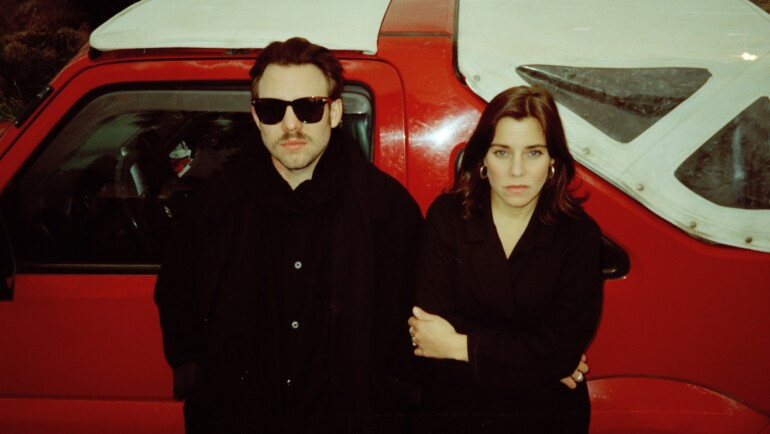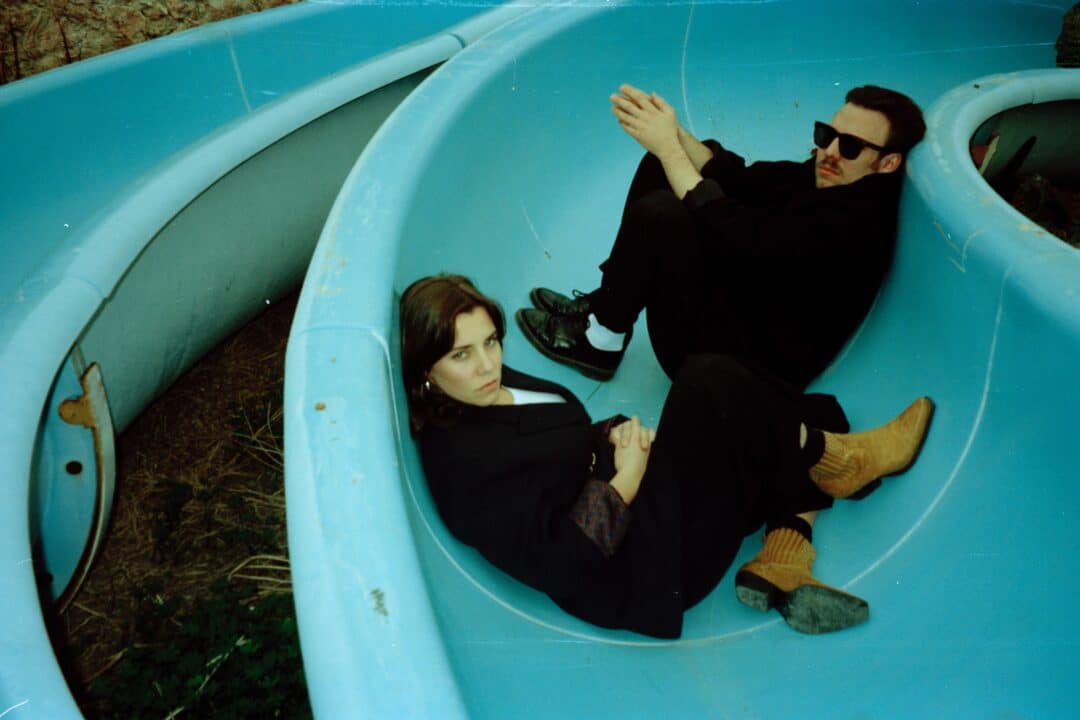
On March 31st, the duo MYNTH released their fourth LP on their house label, Assim Records. The record is simply titled “Four”. The siblings Giovanna and Mario Fartacek talked to Dominik Beyer about the album’s creation, the relevance of elaborate music videos, and whether the subsidies for albums in Austria are up to date. Have concertgoers gotten too lazy or have promoters too cautious? This question, too, is a subject of the interview: mid-sized bands have had to get used to cancellations due to sluggish advance ticket sales – so we asked a pair of musicians who have spent time organizing a festival as well as being on stage.
How did you make the new album?
Mario Fartacek: With Giovanna on the piano and me on the guitar. We settled on the harmonies in advance and decided to record everything at once, in order to get that demo vibe. Up to that point, we had always done pre-production, which meant that often, by the time we got to the final recording, we had heard the song too often already. That can really kill the atmosphere. This time, we jammed in the studio and recorded everything.
Giovanna Fartacek: We also made a point of getting away from the computer. Previously, we had often started out with a synth pad and a drum loop, but this time we tried to capture the emotion that we created playing our instruments and singing. That was the basic idea, and then we tried to develop it. That helped us break the songwriting habits we had gotten into.
Mario Fartacek: And also made it clear that it wasn’t going to be a primarily electronic album.
How much do you factor in what your target audience wants to hear during production?
Mario Fartacek: We don’t have a huge fan base that knows us mostly from a big hit, for example, so we’re fairly free to shape things the way we want. The people who come to our concerts enjoy the fact that we’re so varied – hopefully, that’s what makes us stand out.
Giovanna Fartacek: We played a couple of duo shows last summer where we did a downtempo electro set. It was fun, but I kind of missed the organic element; it was hard to get into it emotionally. That might also be part of the reason we decided to go acoustic. To be honest, I didn’t think at all about who I wanted to aim the music at during production, which allowed me to get into a flow where it was totally irrelevant. That was nice. We’re also aware that our career isn’t going to make some huge leap – but at the same time, we know we’re always going to make albums, simply because we love doing it.
“…no one considered the fact that an artist needs money to live on during the process of creation.”
But you wrote the songs before the month of production, right?
Giovanna Fartacek: No, we did it all in one month.
High performance!
Mario Fartacek: There wasn’t much space for things to go wrong.
Giovanna Fartacek: A song every day.
Mario Fartacek: The tour in April had been booked for a while, and the deal with the promoters is that an album was going to be released. We just didn’t get around to writing any earlier. Our festival was more work than we had expected. After the festival we called Austrovinyl to find out when they needed the master, so that the records would be finished before the tour started, and they actually said they needed it immediately.
Everything worked out. Thanks for the copy! That means they were very quick as well – I’m used to a lead time of six to nine months.
Mario Fartacek: That’s the way it always was. It seems like they’ve gotten a little quicker with the new pressing facility. But we absolutely couldn’t have taken any longer.

Mario, you’ve produced a lot of other bands. What can you apply to your own project?
Mario Fartacek: When you’re in the studio as a band, you often end up not being able to see the forest for the trees, and you end up falling into old habits. To me, the responsibility of a producer is to keep breaking those habits, to keep it fresh. You have to keep the band creative and make sure that there’s space for moments of serendipity to occur now and then. That’s the work of the producer, as I see it. That attitude helps us with MYNTH as well.
Do you think the budget for music subsidies is still up to date?
Mario Fartacek: All subsidies are business subsidies. In short, anyone who gets supported by the Österreichischen Musikfonds [Austrian Music Fund] makes everyone happy except themselves – the money goes directly into the production of the album. But no one considered the fact that an artist needs money to live on during the process of creation. Apart from a very few government stipends that unconditionally support an artist for a year, the subsidies are always tied to album costs. When you think about the fact that you can’t go out and work during this period, you realize that being able to make an album is partly a question of class. People should really think about that.
Why did you start your own label? Were you unhappy with the Austrian label scene?
Mario Fartacek: In the beginning, we thought of it as a collective; our first releases were all from our circle of friends. Valentin Eder’s engagement was what made it into a professional label, along with Ilias Dahimène und Theresa “Therry“ Langner, at the beginning.
Do you see yourselves in a particular niche? Are you taking on projects from new artists? What does it take to be part of the Assim family?
Mario Fartacek: We talked a lot about whether we wanted to concentrate on a particular genre. The real criterion for us is whether the music speaks to us. Do the songs get under our skin? That’s what we listen for in demos.
“It’s a paradox that visuals are more essential…than ever before. And at the same time, the music video as a medium is apparently too long. (laughs)”
You’ve co-produced or commissioned several elaborate music videos. Are music videos still relevant in the streaming era?
Giovanna Fartacek: We just talked about this on the way here, because we still have to do the main single. We’ve always made a real effort there, because the visual aspect is very important to us. On the other hand, a high-quality video takes a lot of money and time to produce. And in the end, best case, a few thousand people watch it. Attention span has dropped to maximum 30 seconds since Instagram and TikTok, so you have to ask yourself: what’s the point?
A lot of people click away while the advertising clip is still running…
Giovanna Fartacek: Exactly. That’s often really what happens. It’s the bitter reality. At the same time, you want to try to fight it. Our streaming numbers aren’t so massive that we can afford to do without visuals.
Mario Fartacek: It’s a paradox that visuals are more essential to our media than ever before. And at the same time, the music video as a medium is apparently too long. (laughs)
It still appeals to me when someone has a cool visual idea to go with their song. That’s why we’re still making videos – it helps us tell a story. It is still important to us, but probably less so than in the past.
So is it even worth it to invest a lot of time and money in videos?
Giovanna Fartacek: Well, I would definitely recommend some kind of visual component. Trying to find a label with a Soundcloud link isn’t really wise, if you ask me. It doesn’t necessarily have to be a super-high-gloss video; you can be really creative with DIY videos.
Some say people have gotten lazy since the pandemic, that they’d rather stay home and watch Netflix than go to a concert. Can you confirm that?
Mario Fartacek: We can’t say till after the tour.
Giovanna Fartacek: Yes, unfortunately.
Mario Fartacek: The spontaneous things are working again, like going to a concert on the Gürtel. The big events are functioning very well, too. Acts like Helene Fischer are selling out the Stadthalle five nights in a row. But at the middle level, advance ticket sales are much worse than before the pandemic. It seems like no one wants to plan any more.
Giovanna Fartacek: Advance sales are basically nonexistent right now.
“Acts that can’t guarantee a full house don’t get booked anymore. That doesn’t exactly promote diversity in the cultural scene.”
Mario Fartacek: But promoters still partly have the attitude that concerts get cancelled when advance sales haven’t been strong enough. They should know that it doesn’t work that way right now. People do come spontaneously. But [promoters] probably see the risk as too great.
Giovanna Fartacek: Our festival was like that. You can’t plan any more as a promoter. You have to trust that the act will bring people in, that they’ll buy their tickets at the event. I get the uncertainty, of course, but the subculture is really suffering because of it: acts that can’t guarantee a full house don’t get booked anymore. That doesn’t exactly promote diversity in the cultural scene.
Your festival in Hallein had a full house; you booked three stages parallel to one another, on two consecutive nights. One of them was the big Salzburg Festival stage on Perner Island.
Giovanna Fartacek: At the beginning of the week, I think we had only sold fifty tickets. We were really sweating. Even with a hundred people, the audience at the festival stage would look extremely empty.
So there’s going to be a sequel?
Giovanna Fartacek: Absolutely.
Mario Fartacek: In May 2024.
Giovanna Fartacek: I also think the format was really refreshing. Getting away from short-lived things.
How can you fight that transience?
Giovanna Fartacek: By going the opposite direction. Away from streaming. You have to give music, in its purest essence, the status it deserves.
Although being absent from streaming platforms is probably unthinkable, isn’t it?
Giovanna Fartacek: Probably. Still, it’s a question whether you have to participate in every TikTok trend. Everyone’s on Instagram – but there, too, you have to submit to algorithms in order to reach a good number of people.
Mario Fartacek: You really have to like doing it, too. TikTok is a very different format. If we do it the way we do our Facebook page, no one’s going to be interested.
What newcomers should we be paying more attention to in the future?
Mario Fartacek: One of the best live bands right now is the Siamese Elephants. We played with them in Cairo. Of course, they’re not newcomers any more.
Giovanna Fartacek: I think Elsa should also be getting more attention.
Mario Fartacek: And Amelie Tobin.
Giovanna Fartacek: She’s so tireless; she doesn’t let anyone get her down, even if she can’t get any airplay because FM4 turns her down again. She’s doing her thing.
Thanks for the talk!
Dominik Beyer
Translated from the German original by Philip Yaeger
